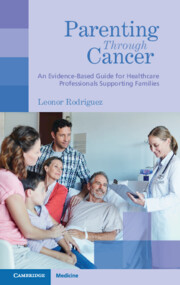Refine search
Actions for selected content:
9 results
Posttraumatic growth in young adults with parents diagnosed with cancer: Application of the self-regulation model
-
- Journal:
- Palliative & Supportive Care / Volume 23 / 2025
- Published online by Cambridge University Press:
- 08 November 2024, e5
-
- Article
-
- You have access
- Open access
- HTML
- Export citation
Chapter 7 - Terminal Cancer and Bereavement
-
- Book:
- Parenting through Cancer
- Published online:
- 15 September 2022
- Print publication:
- 22 September 2022, pp 91-112
-
- Chapter
- Export citation
Chapter 1 - Impact of Parental Cancer
-
- Book:
- Parenting through Cancer
- Published online:
- 15 September 2022
- Print publication:
- 22 September 2022, pp 7-26
-
- Chapter
- Export citation
Introduction
-
- Book:
- Parenting through Cancer
- Published online:
- 15 September 2022
- Print publication:
- 22 September 2022, pp 1-6
-
- Chapter
- Export citation

Parenting through Cancer
- An Evidence-Based Guide for Healthcare Professionals Supporting Families
-
- Published online:
- 15 September 2022
- Print publication:
- 22 September 2022
Psychological Impact of parental cancer on children
-
- Journal:
- European Psychiatry / Volume 65 / Issue S1 / June 2022
- Published online by Cambridge University Press:
- 01 September 2022, pp. S421-S422
-
- Article
-
- You have access
- Open access
- Export citation
Dying concerns in young parents with advanced cancer (PWAC): A scoping review
-
- Journal:
- Palliative & Supportive Care / Volume 19 / Issue 1 / February 2021
- Published online by Cambridge University Press:
- 15 May 2020, pp. 93-102
-
- Article
- Export citation
Upping my game as a parent: Attributed gains in participating in a cancer parenting program for child-rearing parents with advanced cancer
-
- Journal:
- Palliative & Supportive Care / Volume 18 / Issue 3 / June 2020
- Published online by Cambridge University Press:
- 09 March 2020, pp. 339-345
-
- Article
- Export citation
Effect of a group intervention for children and their parents who have cancer
-
- Journal:
- Palliative & Supportive Care / Volume 15 / Issue 5 / October 2017
- Published online by Cambridge University Press:
- 23 January 2017, pp. 575-586
-
- Article
- Export citation
